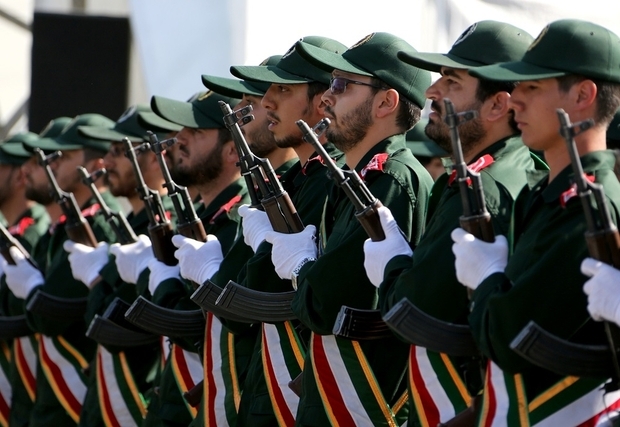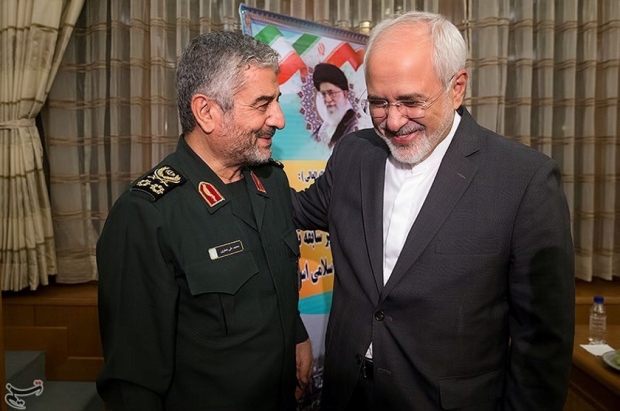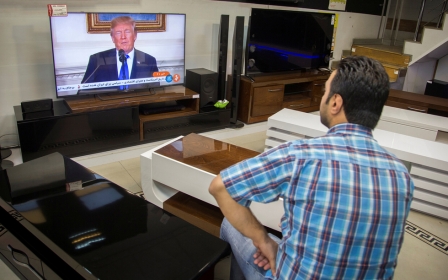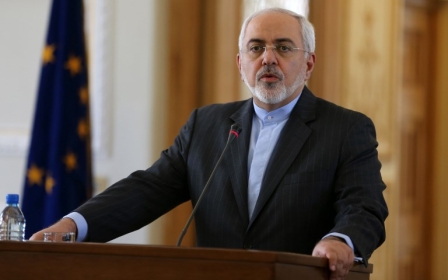Iran’s Revolutionary Guards will use Trump’s speech as an opportunity

Donald Trump’s decertification of the Iran nuclear accord, also known as the Joint Comprehensive Plan of Action (JCPOA), drew an immediate reaction from Iranian president Hassan Rouhani, who derided Trump’s “ignorance” as well as his bullying rhetoric on Iran.
Rouhani kept up the counter-offensive earlier today in a meeting with the new Swiss ambassador to Tehran by asserting that any damage to the JCPOA is tantamount to undermining the security and stability of the region and the wider world.
Beyond official reaction, ordinary Iranians have reacted strongly on social media to Trump’s blistering attack on their country and his depiction of the Islamic Republic in the starkest terms possible.
Another striking, if not unexpected, aspect of Trump’s speech was his forceful attack on the Islamic Revolutionary Guards Corps (IRGC) which he misleadingly referred to as “the Iranian supreme leader’s corrupt personal terror force”. However, Trump stopped short of designating the IRGC as a terrorist organisation, a move that senior Iranian officials had warned would be tantamount to a declaration of war.
Trump’s conflation of the nuclear accord with Iran’s regional policy is at the heart of his decertification of the JCPOA. Moreover, this conflation takes as its locus the IRGC, which is at the forefront of formulating and implementing Iran’s policies in Syria, Iraq and Yemen, in addition to guiding policy on regional enemies Saudi Arabia and Israel.
But the IRGC (also known as the “Pasdaran”) high command will not be too worried by the US president’s rhetorical onslaught. For a start, it is not at all clear how the US can push back against the IRGC in regional hotspots without provoking a military confrontation with Iran.
For their part, Pasdaran commanders are likely to seize on this new level of US hostility by pouring more energy and resources into their strategic programmes, in particular their ballistic missile industry. And they will capitalise on renewed public support to rebuild their reputation at home.
Trump’s folly
Even before his incendiary speech, there were strong signs that Iranian state and society were rallying behind the IRGC in anticipation of hostile US moves. At the highest level, Rouhani set aside his minor disagreements with the IRGC to proclaim that the Pasdaran have a place in the heart of the Iranian people. He also described the IRGC as “beloved by the people of Iran, Iraq, Syria, Lebanon and Iraqi Kurds”.
The IRGC may not be beloved by the entire region as Rouhani suggests, but they are certainly much respected in Iran. This respect is rooted in the Iran-Iraq War, when the Pasdaran and their extensions (in the Basij popular mobilisation forces) were at the forefront of Iran’s war effort and made the lion’s share of sacrifices.
Both in constitutional and institutional terms, the IRGC is Iran’s most important organisation and cannot be reduced to a mere instrument of the leadership. The foundational moment of the Pasdaran’s creation is critical to this analysis: They were formed in May 1979, just three months after the victory of the Iranian revolution. Thus, the Pasdaran embody the collective will of the Iranian revolution and are invested with its physical and ideological protection.
The IRGC’s revolutionary foundation, coupled with its constitutional mandate, in addition to the brutal experience of the Iran-Iraq War, has transformed the Pasdaran into a full-fledged tri-service military organisation. This makes Iran the only country in the world with two independent military commands: the regular military and the IRGC.
But the Revolutionary Guards are much more than a military organisation. Their “ideological” mission, defined as protecting the political and ideological boundaries of the Iranian revolution, has led them to develop sophisticated domestic and foreign intelligence units.
In addition, the IRGC sponsors a wide range of media groups, notably the influential Fars news agency. But it is the Pasdaran’s economic activities that arouse controversy and resentment inside Iran. The Pasdaran control major infrastructure projects through the Khatam al-Anbiya Constructions Headquarter, a sprawling organisation that reportedly employs 135,000 personnel.
What Trump was specifically taking aim at was the IRGC’s influence on Iran’s regional policy. In this domain too the Pasdaran have well-developed specialised tools to formulate and implement policies at both micro and macro levels.
Forlorn mission
The Pasdaran’s entry point into regional policy was their intensive engagement with Iraqi Shia exiles during the Iran-Iraq War. The IRGC partly sponsored the creation of the “Supreme Council for Islamic Revolution in Iraq” (now called the “Islamic Supreme Council of Iraq”) in November 1982. SCIRI’s armed wing, the Badr Corps, was fully integrated into the IRGC order of battle as the “9th Badr Corps”.
The Badr Corps (now called the “Badr Organisation”) played a leading role in security sector reform in post-Baathist Iraq. More recently, and taking full advantage of the instability created by the Islamic State (IS) group, the IRGC has spearheaded the development of a parallel security infrastructure in Iraq known as the Popular Mobilisation Units.
The Pasdaran’s pushback against the IS group in both Iraq and Syria is managed by the Quds Force, the IRGC’s expeditionary wing. The origin of the Quds Force is closely tied to that of the Badr Corps in so far as they were sister units occupying the same position in the IRGC hierarchy.
Trump has created an ideal opportunity for IRGC commanders to fully rebuild their reputation inside Iran
Known originally as “2nd Quds Corps”, the Quds Force expanded after the conclusion of the Iran-Iraq War and saw action in Iraq, Afghanistan, Sudan and as far away as Bosnia during the Balkan wars of the 1990s. The outbreak of the Syrian conflict in 2011 gave the Quds Force the opportunity to spearhead Iran’s first avowed foreign military deployment since 1973 when the Shah sent forces to Oman to quell the Dhofar rebellion.
Beyond imposing further sanctions and indulging in bombastic rhetoric, it is difficult to see what Trump can do to push back against the Quds Force in Middle Eastern conflict zones. In Iraq and Syria, the Quds Force works with multiple local partners, some of which (in Iraq at least) also have a working relationship with the US military.
For its part the IRGC appears to be preparing for rough waters ahead as announced by deputy chief of staff of the Iranian armed forces (and IRGC member) Brigadier-General Massoud Jazayeri. Beyond stepping up their activities in conflict zones, the IRGC aerospace force, commanded by Brigadier-General Amir Ali Hajizadeh, will almost certainly intensify missile testing with a view to strengthening deterrent capabilities.
Finally, Trump has created an ideal opportunity for IRGC commanders to fully rebuild their reputation inside Iran after the disputed presidential elections of June 2009, which implicated the Pasdran in internal repression.
Trump’s highly selective reading of history and his gross misrepresentation of Iran, in addition to his provocative gesture of misnaming the Persian Gulf as the Arabian Gulf, has riled up Iranians on social media with the #nevertrustusa hashtag going viral.
The Pasdaran and their allies in the political establishment will fully capitalise on the wave of nationalism that is expected to sweep Iran in the months ahead. Iran-US relations, which have been fractured since 1979, may have just entered into their tensest and dangerous phase yet. It is unlikely that Trump will end up on top.
- Mahan Abedin is an analyst of Iranian politics. He is the director of the research group Dysart Consulting.
The views expressed in this article belong to the author and do not necessarily reflect the editorial policy of Middle East Eye.
Photo: File photo of Iranian Revolutionary Guard soldiers (AFP).
This article is available in French on Middle East Eye French edition.
New MEE newsletter: Jerusalem Dispatch
Sign up to get the latest insights and analysis on Israel-Palestine, alongside Turkey Unpacked and other MEE newsletters
Middle East Eye delivers independent and unrivalled coverage and analysis of the Middle East, North Africa and beyond. To learn more about republishing this content and the associated fees, please fill out this form. More about MEE can be found here.






